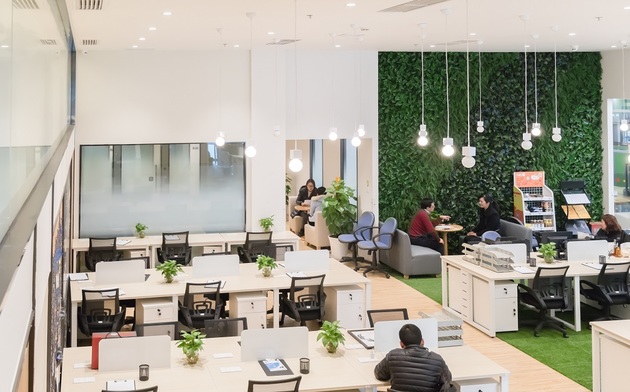
Photo/Shetuwang
Jan. 8 (NBD) – Bakery owner Zhou Ancheng was informed by office-sharing operator ibase on December 25 last year to move out by January 15, which is two and a half years earlier than the renting contract.
The reason behind the sudden notice, according to ibase, is the long-time operational loss and bleak prospect of profitability, but Mr. Zhou learned from other sources that ibase terminated operation because Wework, the company that started the office-sharing model, offered higher rent to the property owner.
The space-sharing sector is seeing frequent mergers and acquisitions, and players are adjusting development strategies, but the impacts on tenants are seldom considered.
In November 2016, Mr. Zhou rented seats in one of ibase's spaces in Vision Shenzhen Business Park (the Park), located in Shenzhen High-tech Industrial Park. Later in June 2018, he opened a bakery at the entrance of the space with a three-year lease from ibase.
Zhou said he doesn't mind finding a new office, but insisted the bakery shouldn't be closed as investors and consumers might see it as operational failure, which would have serious impact on his bakery brand.
Vision Shenzhen Business Park houses leading drone maker DJI Technology Co Ltd, neighboring Ant Financial's Shenzhen branch and Amazon's cloud service AWS. The tech hub attracted many start-ups to ibase's space in the Park.
Moreover, the operator of ibase is fully owned by a company controlled by Gemdale Properties & Investment, which is the property owner of Vision Shenzhen Business Park. A former ibase employee told news outlet Yicai that while the Park charges clients 180 yuan (26.3 U.S. dollars) to 200 yuan (29.2 U.S. dollars) per square meter per month, the rent for ibase is 72 yuan (10.5 U.S. dollars).
The gap between the rent from property owners and rent to tenants is the major source of profit for office-sharing companies. The Park's convenient location and low rent seemingly secured the profitability of ibase's space.
The former employee revealed that 40 percent seats taken can ensure the space's profitability. The monthly profit was 600,000 yuan (87,716.7 U.S. dollars) to 700,000 yuan (102,336.2 U.S. dollars) in peak period.
But it all depends on the low rent. Now the Park decided to lease the spaces of ibase to Wework at 160 yuan (23.4 U.S. dollars) per square meter per month and Wework also promised to pay a fixed proportion of revenue to the Park
The office-sharing pioneer entered China in 2016 with its first space in Shanghai, and entered Shenzhen in 2018. It is reported that last November SoftBank committed to invest 3 billion U.S. dollars in Wework, even though the latter saw 2 billion U.S. dollars losses in 2018 at that time.
With sufficient funding, Wework focuses more on expansion instead of profiting. In April last year, Wework acquired China's office-sharing start-up Naked Hub with 2.5 billion yuan (365.5 million U.S. dollars). The sector has since seen a reshuffling, but the voices of the start-ups lodging in these spaces are overlooked.
Wang You, an entrepreneur and tenant of ibase in Vision Shenzhen Business Park, claimed compensation of three-month rent when asked to relocate before the contract expired, but the Park did not respond to his request.
"Start-up companies like us don’t have the time and energy to argue with them," said Wang, "but they should at least say sorry".
Email: limenglin@nbd.com.cn


 川公网安备 51019002001991号
川公网安备 51019002001991号





